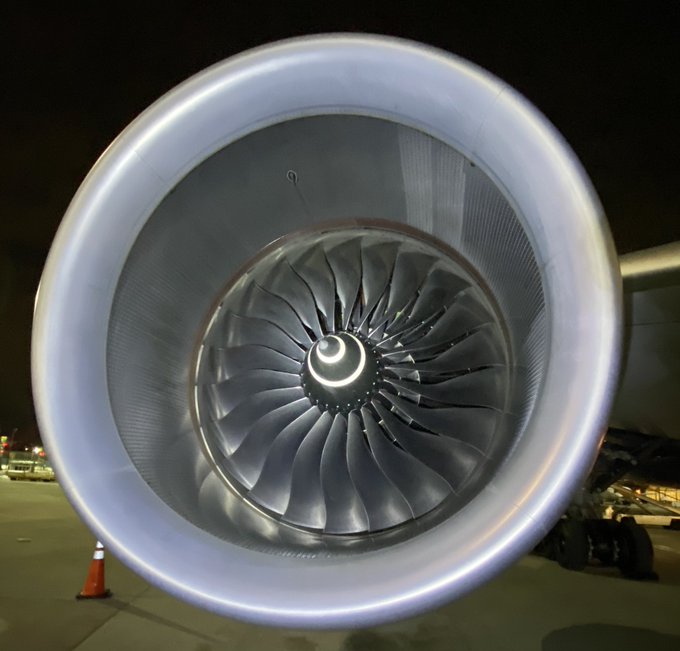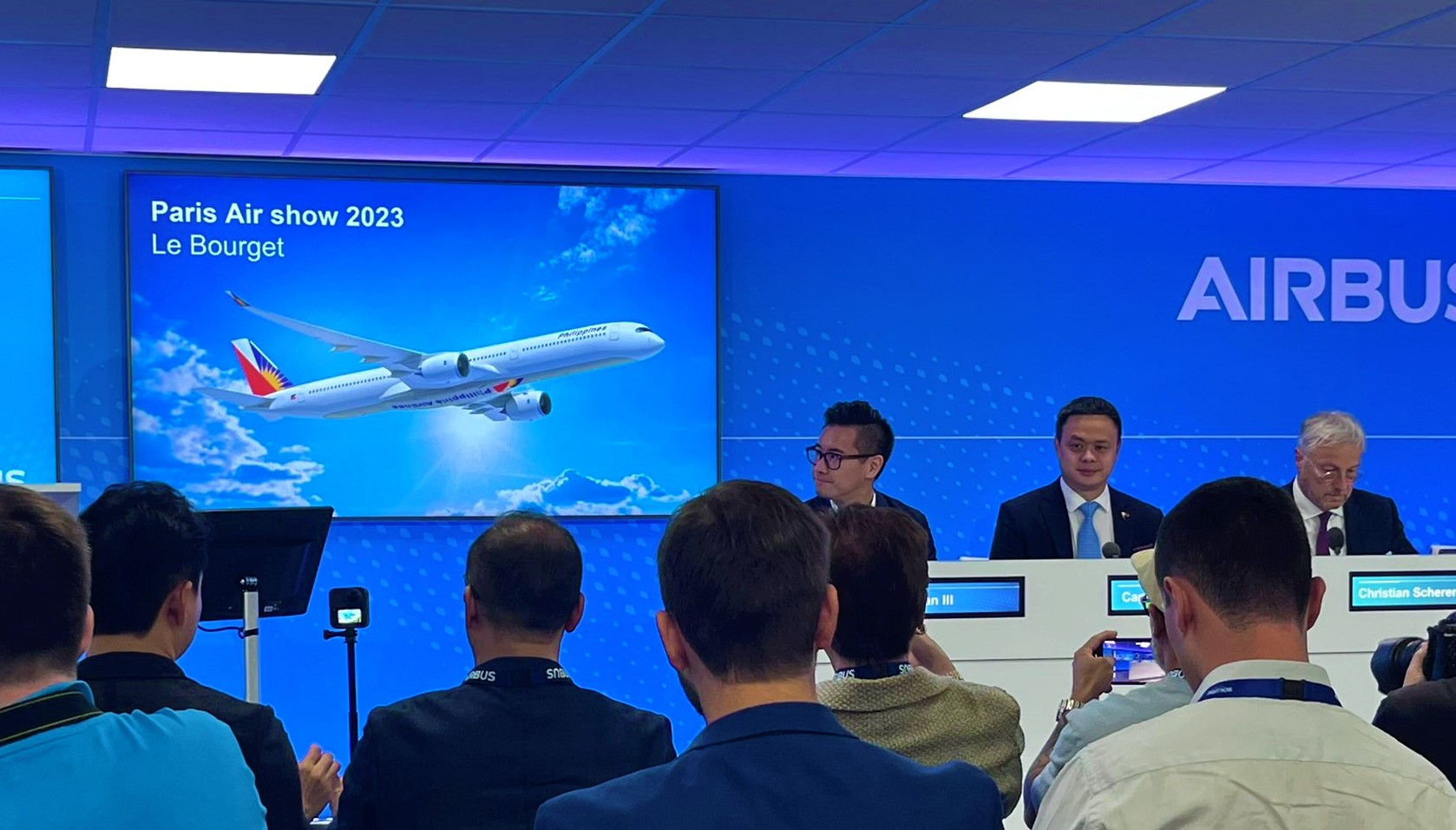 Toulouse, 10 May 2023 – Philippine Airlines (PAL) has signed a Memorandum of Understanding (MoU) with Airbus in a deal worth over US$3 billion for the purchase of nine A350-1000s for delivery beginning on the 4th quarter (October, December) of 2025 until 2027.
Toulouse, 10 May 2023 – Philippine Airlines (PAL) has signed a Memorandum of Understanding (MoU) with Airbus in a deal worth over US$3 billion for the purchase of nine A350-1000s for delivery beginning on the 4th quarter (October, December) of 2025 until 2027.
Under the Philippine carrier’s Ultra Long Haul Fleet project, the A350-1000 will be operated on non-stop services from Manila to North America, including to the East Coast of the US and Canada, replacing the Boeing 777-300ERs. (See our story here on why A35K is the next big thing for PAL)
The new aircraft will join two A350-900s already in service at the airline and currently flying to destinations in North America, Asia and Australia. PAL was forced to subleased four of its A350-900 ordered from Airbus to German Carrier Lufthansa for six (6) years, a result of its Chapter 11 bankruptcy protection which it exited in December 2021.
As with the A350-900, the PAL A350-1000s will be configured in a premium layout with separate Business Class, Premium Economy and Economy Class cabins. They will be powered by Rolls Royce Trent XWB-97.
The MOU also covers purchase rights on three (3) additional A350-1000s by 2028 for future expansion to new long-haul destinations.
PAL did not disclosed the deal with Airbus, but listings on Axon Aviation, a London-based aircraft sales and leasing company, showed each brand new A350-1000 jets together with its pair of Rolls Royce engines and interior amenities is valued at $355.7 million, bringing the airline’s total investment to over US$3 billion. Airbus stop publishing lists price in 2019.
Captain Stanley K. Ng, President and Chief Operating Officer of Philippine Airlines, said that the range of the A350-1000 would enable the airline to fly non-stop transpacific and transpolar routes in both directions all year.
These will include some of the longest commercial flights in the world, such as those linking the Philippines with New York and Toronto.
"With an expanded A350 fleet, PAL will have the ability to once again provide a direct link from the Philippines to Europe," Ng said.
“The A350-1000 combines greater range capability with the higher capacity we need to serve future demand. It’s the perfect aircraft to enable PAL to meet its expansion plans in a sustainable way, while offering passengers the highest levels of onboard comfort. We are committed to offering our passengers the best possible travel experience, and these state-of-the-art aircraft will enable us to do just that as we carry out our mission to connect the world, and grow trade and tourism.” He adds.
Christian Scherer, Airbus Chief Commercial Officer, said: “Flying passengers farther and in greater comfort, the A350 brings a step-change in fuel efficiency and an immediate significant contribution to reduced emissions. These are the attributes that have made the A350 the choice of leading airlines worldwide. We look forward to working closely with our long-standing customer Philippine Airlines as it moves forward with its long haul fleet modernisation programme.”
The A350 is the world’s most modern and efficient widebody aircraft and has set new standards for intercontinental travel. It offers the longest range capability of any commercial airliner in production today and is capable of flying 8,700 nautical miles or 16,100 kilometres non-stop.
At the end of April 2023, the A350 Family had won 928 firm orders from 54 customers worldwide, making it one of the most successful wide-body aircraft ever. Some 530 aircraft are currently in the fleets of 40 airlines, flying primarily on long haul routes.
Philippine Airlines operates various Airbus types on its full service network. In addition to the A350 on long-haul intercontinental routes, PAL flies A330-300s on services to the Middle East, Australia and various points in Asia. The Philippine flag carrier also operates a fleet of A320 and A321 single aisle aircraft on its extensive domestic and regional network out of hubs in Manila and Cebu.
The MOU signed by Philippine Airlines and Airbus is not yet a final order, and aircraft type and quantity may change according to future negotiations as both fine-tune the contractual details which can take weeks or months to complete.
PAL is expected to operate a fleet of 15 Airbus A350s by 2028, with six -900s and nine -1000, exclusive of purchase rights to be acquired at a later date.


Good decision instead of waiting for the B777x which is not yet in service
ReplyDeleteNext waiting for the Boeing 787-9 to be ordered as replacement for the Airbus A330-300
DeleteI still believe there is room for the 779 for their bread and butter routes to LA and SF and the occasional Vancouver. Once the new airport opens, there is tremendous potential. I also believe that PAL will always be a Boeing customer because of the geopolitical ties alone even if they're not a primarily Boeing customer like in years past (similar to Qantas). And if/when they order the 789. they'll choose GE as they'll need it for extra range.
ReplyDeleteI believe that the B777-9 is much too big for PAL. The only way to maintain ties with Boeing is to select a B787-9 suitable for A330 replacement and ultra long haul compliment.
DeleteDoes this mean the 77W pilots of PAL will lose their jobs? That is why I've noticed some 77W pilots have transferred to 5J and switched to A320 series certification. They have foreseen this that PAL wont get the 779. Also, does anyone know which 77W was first retired, was it RP-C7777? They now only have 9 in the fleet.
ReplyDeleteI think it is RP-C7781 which left the fleet.
DeleteB77W pilots will likely move to the B789/B78X, while A333 pilots will move to the A35K. Or the other way around in which Boeing pilots will re-train for Airbus, and Airbus pilots will re-train for Boeing.
DeleteYeah that is probably likely scenario the pilots for the B77W will be transferred to the smaller Boeing Dreamliner, I'd love to see the B787-10 in the Sunriser livery and would definitely boost belly cargo capacity and more comfortable to fly onboard for the OFW traveling in the Middle East from the 9-abreast A330-300. Though I don't totally discount the A330-900neo as Airbus can offer them at really cheap rates then the B787-10 and not sure if OFW really care about comfort over price for those routes?
DeleteAlso, may I add some correction here? According to other forum, the B78X doesn't have enough range to fly transpacific even with original specifications and product improvement package. Meanwhile, the B788 is much too small for PAL since it is cargo hungry airline. The B789 is indeed, a perfect fit for PAL.
DeleteBoeing wants to increase the 7810's MTOW, so it's something to consider.
DeleteOriginal specifications for the B78X is actually a 7,000 nautical miles aircraft. Boosting a six tonne increase is still not enough to fly from key USA west coast cities for PAL (esp, San Francisco and Los Angeles flights back to Manila). Now if PAL wishes to order the B78X, only Vancouver, Honolulu, Auckland, Sydney, Melbourne and other Arabian Peninsula cities can cover it.
ReplyDeleteStill, the B789 is a perfect fit for PAL. Only if they configure less than 300 to complement ultra long haul flights.
The range of the B78X is similar to the 242t variant of the A333. The only difference is in the economics side of things and the vaunted 3 inches wider cabin of the 787. The B789 however is a different animal throwing the latest A339 variant out of the water. -Bob
DeleteWhile is it everyone wants PAL to have a new Boeing aircraft? There many production issues especially with the new Boeing airplanes. It is already a bad reputation for Boeing and there already losing customers because of their bad reputation. PAL won’t let affect like that kind of issue as it will lose so much revenue. So better let PAL to be an all-Airbus fleet similar to their rival LCC Cebu Pacific. It will have so much advantage for being just airbus like the fly by wire cockpit commonality and the advantage for aircraft maintenance and health management. 77W pilots can find a better job in other areas like Middle East if they want to just pilot Boeing 777 of 77X. But if they want to stay in PAL they will have to retrain for Airbus certification because that is where PAL will be heading to.
ReplyDeleteAdditionally, better for PAL to just order for A330-900 neo for A333 replacement as they can lure airplane mechanics from their rival as they have already have an expertise with A339. Plus a 3-class A339 can reach as far from Frankfurt and Seattle.
DeleteIt's still my firm belief that PAL will have a Boeing a/c. Geopolitics will always play a major role with their decision especially now that Marcos is pivoting back to the U.S. Similar to Qantas who has a predominant Airbus fleet, they still have a Boeing a/c. (737 to be retired in lieu of the A321neo) The A330neo wouldn't work on TPAC flights especially with a full load.
DeleteYet it did not discouraged other airlines from ordering the Boeing variant despite the latest flaws. Admittedly, it is still a good plane.
DeletePAL needs to get rid of 2-3-2 in business class. Almost all long range flights use 1-2-1. It is just stupid that a person pays high ticket prices and is jammed next to two other people in the middle seat.
ReplyDeleteThat's right. Also, Turkish Airlines have 2-3-2 on all 33 B77Ws (both 349 and 400 seats). That business class layout isn't a direct aisle access in which a passenger sitting in middle or window seats must leap themselves out each and everytime going to the lavatory.
DeleteJapan Airlines' 13 strong B77Ws are all 2-3-2 in business class layout but with aisle access. Please search on Google: JAL SkySuite.
When in comparison to business class seats re 2-3-2, both PAL and Turkish Airlines use Safran Aura Lite. They aren't built for direct aisle access. Meanwhile, Japan Airlines uses Collins Aerospace Serenity seats with direct aisle access albeit in 2-3-2 layout.
DeleteAgreed. It seems the business class is the same as the A359 so it is 1-2-1. What is sad is the 3-4-3 Y config which make it a sardine can despite a 34" pitch. The premium Y is likewise bad at 3-3-3 for the 35k instead of the 2-4-2 of the A359. The saving grace is it has the same width as that of the B789 at 3-3-3 Y at 16.2". The J however is 2-2-2 all aisle access. I guess it would be the norm in the PI soon. Not good for me though. I'd rather stick to the 18" wider 77w while it last - Bob
Delete